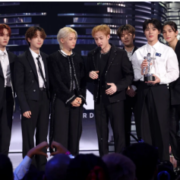Introduction: What is a femenine male idols?
Contents
- 1 Introduction: What is a femenine male idols?
- 2 The rise of femenine male idols in the K-pop industry
- 3 The appeal of femenine male idols to fans
- 4 Impact on traditional gender roles and perceptions
- 5 Criticisms and backlash against femenine male idols
- 6 How the industry is evolving to embrace diversity
- 7 Conclusion: The future of femenine male idols and their impact on society
The world of K-pop has always dazzled fans with its glitzy performances and catchy tunes. But lately, a new trend has captured the hearts of audiences: femenine male idols. These artists break traditional molds, blending charm with talent in ways that challenge societal norms. From their striking visuals to their delicate fashion choices, these idols have carved out a unique space within the industry. What is it about femenine male idols that captivates so many? Let’s dive into this fascinating phenomenon and discover why they are soaring in popularity like never before.
The rise of femenine male idols in the K-pop industry
The K-pop industry has witnessed a remarkable transformation over the last decade. One of the most significant changes is the emergence of femenine male idols, who challenge traditional notions of masculinity.
These idols showcase soft features, delicate fashion choices, and expressive personalities that resonate deeply with fans. Their appeal lies not only in their aesthetic but also in their ability to connect emotionally through music and performance.
Groups like BTS, EXO, and SEVENTEEN have embraced this trend by incorporating diverse styles into their visuals and stage presence. As these artists push boundaries, they reflect a broader cultural shift within South Korea—and beyond—where gender norms are increasingly fluid.
Femenine male idols are redefining what it means to be masculine in the entertainment world. They open doors for conversations about identity and self-expression among younger generations looking for representation in popular culture.
The appeal of femenine male idols to fans
Femenine male idols captivate fans with their unique blend of charm, grace, and style. Their fluidity in expression breaks traditional gender norms, creating a fresh perspective that resonates deeply.
Fans are drawn to their aesthetics—colorful outfits and delicate features challenge conventional ideas of masculinity. This visual diversity allows many to explore different facets of identity.
Moreover, these idols often exude confidence while embracing vulnerability. It’s refreshing to witness a male figure openly express emotions through music and performance.
The connection they foster is intimate; audiences feel understood and represented in ways that transcend boundaries. In a world craving authenticity, femenine male idols offer an escape from rigid societal expectations. Each performance invites admiration not just for talent but for the courage to be unapologetically themselves.
Impact on traditional gender roles and perceptions
Femenine male idols challenge conventional gender roles in a way that resonates deeply with fans. They embody traits traditionally associated with femininity, such as vulnerability and emotional expressiveness. This shift invites audiences to reconsider what masculinity can look like.
As these idols gain popularity, they create space for discussions about identity and self-expression. Fans often find solace in seeing their own experiences reflected back at them through these artists. It promotes acceptance of diverse identities in an industry once dominated by rigid norms.
Moreover, the success of femenine male idols signals a broader societal change. Younger generations are more open-minded, embracing fluidity in gender expression. This evolving landscape encourages individuals to explore their authenticity without fear of judgment or stigmatization.
The influence extends beyond music; it reshapes fashion choices and beauty standards too, pushing boundaries further than ever before. As a result, traditional perceptions continue to be challenged daily.
Criticisms and backlash against femenine male idols
Femenine male idols often face scrutiny in a world that values traditional masculinity. Critics argue that these idols challenge societal norms, creating discomfort among some fans and cultural commentators.
Some detractors claim their androgynous aesthetics dilute the idea of masculinity. They worry it sends mixed messages to younger audiences about gender identity. This backlash sometimes manifests as harsh comments on social media or heated debates within fan communities.
Additionally, conservative groups may view femenine male idols as promoting an agenda they oppose. Their popularity can provoke discussions about what it means to be masculine in today’s society.
Despite the negativity, many supporters believe this shift is progressive. They see it as an opportunity for broader acceptance of diverse expressions of identity. The conversation around gender fluidity continues to evolve alongside these artists’ careers.
How the industry is evolving to embrace diversity
The K-pop industry is undergoing a significant transformation. Labels are increasingly recognizing the importance of diversity in their artists’ representations. This shift allows for a broader range of expressions within the genre.
Femenine male idols are now celebrated for their unique aesthetics and talents. Their influence challenges traditional norms, inviting fans to embrace various forms of gender expression. Major agencies are casting more diverse talents, reflecting society’s evolving views on masculinity and femininity.
Social media plays a crucial role in this evolution. Fans actively engage with idols who break conventional molds, fostering communities that celebrate individuality over conformity. The demand for authenticity is louder than ever.
As the landscape changes, collaborations across genres emerge, showcasing diverse talent from different backgrounds. This not only enriches K-pop but also promotes inclusivity on an international scale, paving the way for future generations of artists and fans alike.
Conclusion: The future of femenine male idols and their impact on society
The future of femenine male idols looks promising and full of potential. As society continues to embrace diversity, these idols challenge traditional norms and the rigid expectations surrounding masculinity. Their success signals a shift in how we perceive gender roles in the entertainment industry.
Femenine male idols inspire fans to express themselves freely, regardless of societal constraints. They offer representation for those who identify with non-traditional gender expressions, promoting acceptance within the community and beyond. This growing visibility is essential for fostering conversations around gender fluidity and breaking down stereotypes.
As more artists adopt this aesthetic, it’s likely that the K-pop industry will reflect an even broader range of identities and styles. The rise of femenine male idols could pave the way for a new generation that celebrates individuality over conformity.
Their impact extends far beyond music; they play a crucial role in redefining cultural narratives about masculinity and femininity. By challenging outdated perceptions, they help create a more inclusive environment where everyone can feel validated.
With each performance and appearance, femenine male idols continue to resonate with audiences globally. Their influence has sparked important discussions on identity as well as self-expression—transforming not just their own careers but also shaping societal attitudes toward diverse representations in media.
















